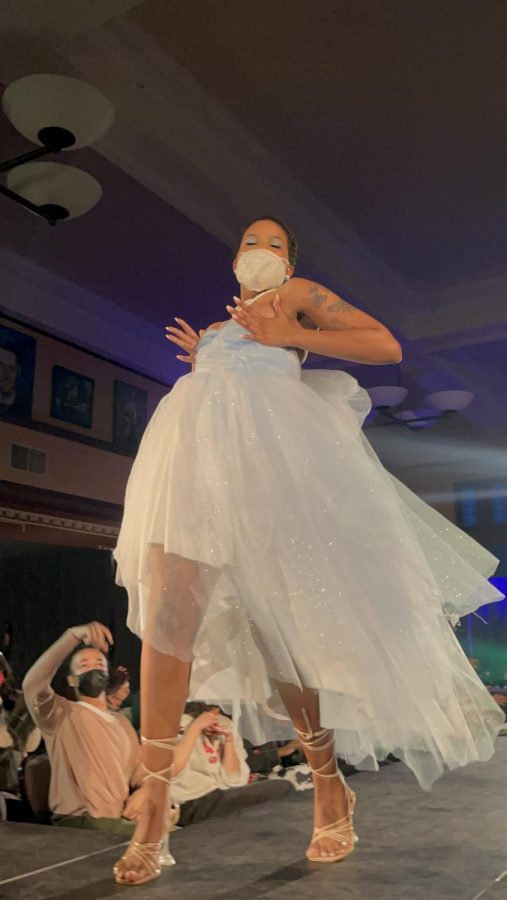Black Student Union to Host “Black People Are Infinity”
College fourth-year Nasirah Fair struts down the runway at the Multicultural Resource Center’s most recent Black History Month event, the Black History Month Fashion Show, held on March 20. The BHM Ball will host students at the Hotel at Oberlin March 26.
A few weeks ago, College second-year Imani Joseph read the line “Black People Are Infinity” while reciting a poem they wrote at an Afrikan Heritage House Soul Session. Since then, Joseph’s words have echoed all around campus on posters advertising this year’s Black History Month Ball. Hosted annually by the Oberlin Black Student Union, ABUSUA, the Ball will take place this Saturday from 8 p.m. to midnight at The Hotel at Oberlin.
College third-year and A-House Program Assistant Evyn Lundy explained that the ABUSUA team chose the line “Black People Are Infinity” as the event’s theme somewhat by chance. It was only after deciding to use a celestial theme that the team heard Joseph’s poem and thought it was perfect. Of course, to the event organizers, Joseph’s phrase does much more than simply call celestial images to mind.
“It’s really supposed to be a reminder that Black people are always here, Black people are resilient; we deserve to be noticed,” Lundy said. “And I feel like a lot of times there’s a lot of invisible labor of Black people — basically meaning that people don’t always directly see the work and the emotions and everything that goes into all of our work.”
College second-year and A-House Program Assistant Wyaé Stewart expressed a similar thought on the depth of this year’s theme, “Black History Month: Black History Year.”To Stewart, infinity means the lasting impact of Black community and culture.
“When you think about it, so much of our culture and … our life is brought into so many different societies,” she said. “And so many people adopt it and use it in their day-to-day lives, just emphasizing that our culture and everything that comes with us is beautiful and it’s infinite. It’ll last for generations to come.”
It is for this reason that the Black History Month Ball is not just another party. College third-year Jillian Sanford explained that, while it is an excellent place to have fun, it also serves a greater purpose.
“The Ball is a way to celebrate all the hard work Black students put in day in and day out at Oberlin, especially during BHM,” Sanford wrote in an email to the Review. “It is a celebration of our resilience and our dedication to making Oberlin a better space for those in our community.”
A large part of that celebration is, of course, having a good time. In the grand scheme of events going on during Black History Month, the ball stands out as one designed to bring everyone together in one space to enjoy an evening of music and community.
“There’s different kinds of events that are going on throughout the month,” Lundy said. “So different kinds of people will attend different events. If you’re interested in the arts, obviously you’re going to want to go to more arts-focused programming. So I think that the ball really serves as a space where we can all come together. [It] serves as a time for everyone to go, everyone to see each other, everyone to just have a good time.”
And the Ball promises to be just that. In addition to a change in venue that the team hopes will help regenerate enthusiasm surrounding the event after the COVID-19 shutdown, ABUSUA will be bringing in a student DJ: double-degree fifth-year Kopano Muhammad, who previously DJed at the Black History Month fashion show.
Beyond the ball itself, ABUSUA and A-House work year-round to empower Oberlin’s Black community and create a space in which students may exchange ideas and support one another while also making their voices heard around campus. Sanford explained that a significant objective ABUSUA is currently working on is the fulfillment of the 2020 ABUSUA Demands, which were released in the wake of the murder of George Floyd and the surge in anti-racist protests around the country.
“We decided that Oberlin needed to be held accountable for how they treated and supported Black students not only during that time but beyond; that is how our list of demands was created,” Sanford wrote. “And while these demands were released in 2020, we are still working with the College currently to achieve many of these goals, making great progress [and] hoping to have the majority of our demands completed by the end of this academic year!”
A-House, meanwhile, remains focused on increasing engagement from the student body with a constant stream of events aimed at fostering a stronger and more involved community.
“A big focus right now in our programming is just trying to see how we can meet people where they’re at,” Lundy said. “Because COVID really has shifted a lot of social dynamics and we’ve noticed that we haven’t had as much engagement in events this year as we had in the past, at least for smaller, more intimate events.”
As the team looks to the future of ABUSUA and A-House, Sanford hopes that enthusiasm about the Black History Month Ball will prompt further motivation from students, both Black and non-Black, to continue to engage with the community they are cultivating.
“For A-House in particular, we hope that students continue to come to events in the house, eat at A-House dinner, and engage with our community. While the house is a safe space for Black students on campus, it is also a learning space for others. We hope that students will continue to engage with us and that we can continue to foster and support the Oberlin Africana community.”










